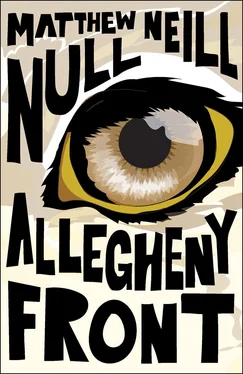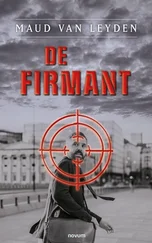He wouldn’t let himself get sewn up with these children again. He would make the perfect captain.
But there was the matter of Ezekiel, which kept it all in mind. The boots belonged to a man Sarsen admired. A good, brave drover. Ezekiel could work the pike like a lancet; for a while Sarsen called him “The Doctor,” but the name never caught.
In the spring of 1876, Sarsen carried them to the staging ground at “Rat’s Mouth,” but Ezekiel didn’t show. Jokes were cracked. Besides that, it was a good run.
1877 the same, boots clopping about Sarsen’s bull neck. The year of wicked heat. The boots annoyed the hell out of him. He quenched his own heels in water. From time to time, smiling fire newts drifted to the surface, sipped a bubble of air, and wriggled back down. Like them, he disappeared when winter came, then returned to the river of a spring, back from nowhere, back from nothing. From what he recalled, Ezekiel was like that, too. He lived for the river. Was a mystery.
In 1877, that wicked year, he saw workers grading hills with Fresno plows, and sulky Irish blew a hole in the mountain.
He carried the boots for years, even after the end of the river runs. Despite his knowledge, his candor, his vicious sense of right and wrong, Sarsen would never make captain. The cream, he realized, would not rise. Life awards the middling. The railroads came.
There was no poetry in it. You dragged trees to the grade with horses and, later, steam donkeys and cranes, cradling logs in Alpine cars. Shay engines hauled them away. Workers built corduroy roads and fashioned iron alphabets of grab hooks, each with its own narrow discipline. No need for rivermen, and just a low, gut craving for the river’s water, to slake a steam boiler from time to time. You could haul overland, right over the mountain. Now, timbering began in earnest. You could cut away from big rivers, and big rivers were few in the grand scheme of things. In the same grand scheme, Sarsen’s river life is a thin, early chapter, more than a footnote, but not the true story. Railroads leveled the forest, fed commerce, changed the place forever. The rivermen had only scratched at it as you would an itch.
All the blasted rivers, all for nothing. On the Grand, the bright scars of dynamite faded. For years, you could buy cheap blasting caps if you knew the place. A sackful made good fishing. Children were shown drill holes in bankside rocks to prove what had happened, and, later, poor sepia pictures of rafts that turned out, on closer inspection, to resemble logs. That and a single iron ring rusting in a midstream boulder. Later still, canoeists would see this oddity and wonder.
Sarsen absorbed all this with wounded grace. He married, and married again. This balm did not soothe. Sarsen’s last wife was pretty but almost blind. Her glasses were thick as a turtle’s shell and did about as much good. She squinted at him fiercely, no matter how close he stood. They had one child, a boy not bright, but that was fine. He was sweet-tempered, and Sarsen gave him jobs he could undertake with success, let the children all do what they’re able to do. It might’ve softened the father. It did not.
And this business of making a living. Strange. He scrounged. When he had worked the river and didn’t give it a passing care, paper bills always found their way into his pocket. Now there was none to be had. He used to say he’d rather be town ratcatcher than a dirty railroad man. When he entered the railroad office, the last to give in, no one could believe it. No one hated the rails more than he.
He’d waited too long. The only work available was building tunnels among Irish. Hot, dusty labor, planting the hard seed of silicosis in your lungs. At a certain hour, lunch was served. Sarsen would lift his plate and walk out to eat alone, so as not to be a railroad man.
All to suture the country with dead rails, which he walked home to Hinton. Sarsen found them hard and punishing to travel upon, by plush car or by your own foot, the steel jolting your joints, “heel-splitters,” he called them: you arrived beaten and demoralized at your destination. But water — well, water was pure glide underfoot. Any man could walk on it like Jesus if he had a mind to. Sarsen walked water seven years, then lived twenty-odd of aftermath. When the railroads neared the end of expansion, with a short-line gauge pushed up every hollow, he finished his days pouring shots in a barroom and cleaning glasses with a rag that was eternally damp. He redistributed germs with a democratic flourish. He thought he was doing right — this was the age of miasma theory — and would hate the notion of inflicting sickness. He liked his patrons. He told stories of Grand River days, was thought a raconteur, a living museum.
Sarsen kept the boots behind the bar, to wave about and punctuate a story, but the yeasty room did something to them. When the leather began to green and be unsightly, the owner made him take them home for good.
Sarsen was putting up glasses when Ezekiel walked in.
Walked in, that is, on the arm of his wife.
Sarsen cried, “Zeke! Zeke!”
No answer.
“Do you remember me? Now don’t deny me!” Sarsen held a nervous grin. “We fought the river together.”
Now, finally, Ezekiel cocked his head, studied the giant in front of him, and offered his tough, little hand. That was all.
It fell to Ezekiel’s wife to explain the luckless thing.
Shortly after they had married, Ezekiel took fever, edged up to death with a searing brow, lived, but the fever deafened him. Gradually he lost the power of speech. A passel of faith healers and doctors couldn’t slow its decline, no matter the rank, expensive poisons they poured down his throat. He could understand you, but struggled to make his desires known. Or was too proud to. His pride, his wife suspected, was what deadened his tongue.
“He ain’t dumb,” she said. “People thinks he’s dumb. Burns me up. He ain’t. He can read your mouth good if you talk at him. He’s the best leatherworker in Kanawha City. I does the ordering and he works his magic. My book’s filled up a year and a half, even if you want a belt. He makes shoes for Senator Gassaway Davis and his pages, too.”
Sarsen was slowly realizing this was one of the women of “Rat’s Mouth,” of the straggling shacks where pay was spent. His charge had not listened.
She didn’t want to talk about the river. Sarsen couldn’t make up his mind whether to ask Ezekiel or the wife his questions, he kept goggling back and forth. Yes, this was Ezekiel, wizened and gray, but still swarthy, still smiling, his bald pate like a hickory nut. One of the new boys Sarsen taught the trade. Zeke, not twenty years old, “The Doctor,” busting jams like human dynamite. He was one you barely had to teach. Just offer encouragement. Sarsen vaguely remembered a night of camaraderie, a stumbling walk back to the arks, arms around shoulders, helping one another onto that bobbing platform that rose and fell, rose and fell, like a carnival game. He had been talked into drinking alcohol. Never again. Or had that happened? Sarsen could not be sure.
Other patrons were getting surly. Sarsen was ignoring them.
“I got something to give you,” he told her. “Give him.”
Could they meet at their hotel for dinner tomorrow?
They were, she said, on a well-deserved rest. At the New Northern, the finest hotel Sarsen ever set foot in, they were served tiny sandwiches that wouldn’t fill you. Sarsen wore his black necktie from work — that much he knew. He was made to check Ezekiel’s boots at the cloakroom. That made him nervous, but the attendant looked trustworthy.
To be safe, Sarsen slipped him a coin.
After being poured a coffee in bone-thin china, Sarsen asked about Henry Gorby. Ezekiel didn’t even blink, but his wife nodded. “Oh yes. We live next to his people, we thought it best to live near family. They never forgive that boy for running off. They said a Mass for years, there at Our Lady of Lebanon. I’m a convert,” she smiled challengingly.
Читать дальше












